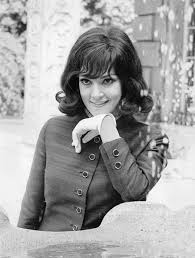OPRY LINKS
16: Sad Sopranos. . .
 
Anna Moffo
Leona Mitchell
Saturdee Opry Links Overture!
Mozart, "La Clemenza di Tito."
https://www.youtube.com/watch?v=yAJVbylLDEU
1.
One of the most piquant arias in all opera certainly must be "Ebben, no andro
lontana," from "La Wally" ("Luh Wuhl-LEE") by Alfredo Catalani. It is pretty
much the only thing that the composer is remembered for, despite having composed
five other operas. The aria has some of the originality and emotive power of
Puccini, which is curious in that Catalani resented Puccini's popularity. The
poor man died at 39 from tuberculosis, but this deeply affecting aria lives on.
Here it is, sung by soprano Victoria de los Angeles.
Setting: The main square of Hochstoff, Switzerland, 19th century
Synopsis: Wally is in love with Hagenbach. However, her father does not like
Hagenbach and wants her to marry his own friend Gellner. He gives her an
ultimatum : marry Gellner or leave the house. When faced with the decision,
Wally decides that she must leave. She despairs that she will never see her
house again but she knows that she must be firm.
https://www.youtube.com/watch?v=6D2uL2S_fcY
Translation:
http://www.aria-database.com/search.php?individualAria=605
2.
If you think that operas are often super melodramatic, concerned with archly
tragic circumstance, and feature emotional singing that is wrenching to
experience. . .you would be right! Here is one such aria, from Verdi's "Un Ballo
in Maschera" ("A Masked Ball"), "Morrò, ma prima in grazia," Or "I will die, but
first in mercy. . ." In a glorious later recording by Maria Callas, where her
voice is surprisingly dark---and very moving.
Setting: A room in Renato's house, Boston, late 17th century
Synopsis: Renato threatens Amelia with death so that she will atone for the sins
she has committed with Riccardo. She pleads with Renato to see her son one last
time before he kills her.
https://www.youtube.com/watch?v=2iD5BfWJN8c
Translation:
https://opera-cat.livejournal.com/17765.html
Or, if you'd rather see it sung by someone in a crazy dress:
https://www.youtube.com/watch?v=XRPLxTBgSlI
3.
Vincenzo Bellini, as you all know, composed groundbreaking operas in the early
19th century. He was known for writing---inventing, really---the first extended,
flowing melodic lines in opera (for which he earned the nickname, "the Swan of
Catania".) Like Catalani, Bellini died tragically young, at 33, from intestinal
complications, yet several of his eleven operas remain part of regular repertory
today---largely due to those flowing, melodious lines. Here is one example, from
"La Sonnambula," "Ah! Non Credea Mirarte." These words, and the line that
follows them, are inscribed on Bellini's tomb. "Ah! non credea mirarti / Sì
presto estinto, o fiore," which translates to "I did not believe you would fade
so soon, oh flower." Here is wonderful Anna Moffo in a tender, exquisite
rendering.
Setting: Near the mill in a Swiss village, early 19th century
Synopsis: While sleepwalking, Amina prays for Elvino and then sings her sorrow.
She remembers the engagement ring that he took from her when he believed she was
unfaithful to him.
https://www.youtube.com/watch?v=FnktTbRZuF8
Translation:
http://www.aria-database.com/search.php?individualAria=678
EXTRA:
Bellini's tomb (very worth a look):
https://en.wikipedia.org/wiki/Vincenzo_Bellini#/media/File:Annoncredamirarti.JPG
4.
Although Bizet wrote his operas forty years (and more) after Bellini, it is no
insight to say that his astonishing melodies owe a debt to Bellini's
groundbreaking work. Here again are the dark, beguiling vocal contours of Anna
Moffo, with the arresting, "Je dis que rien ne m'épouvante," or "Michaela's
Aria," from "Carmen." A prayer for courage.
Setting: A mountain pass
Synopsis: Searching for Don José, who she still loves in spite of the smugglers,
Micaëla finds herself alone in the mountains.
https://www.youtube.com/watch?v=bRrYwTxxQ_g
Translation:
http://www.aria-database.com/search.php?individualAria=41
Poor Ms. Moffo sang herself into premature retirement. She overextended her
capabilities and severely damaged her voice in the late '60s, and never
recovered. Opera is a very perilous undertaking, folks.
https://en.wikipedia.org/wiki/Anna_Moffo
5.
Here is a Verdi aria that, for my money (not a potent boast), is as moving as
one written by Puccini. Poor Violetta, realizing at last that she is dying, bids
"farewell to the past, happy dreams of days gone by. . ." From "La Traviata,"
here is gifted Anna Netrebko in a Metropolitan Opera production, singing "Addio,
del passato." Heartbreakingly beautiful.
Setting: Violetta's bedroom
Synopsis: Violetta is now poor and about to die. She receives a letter from
Alfredo's father saying that Alfredo has discovered why she lied about her love
for him and is coming to her. She knows that it is too late, though, and sings a
farewell to her happiness with Alfredo.
https://www.youtube.com/watch?v=cSr7hh9mbyg
Translation:
http://www.aria-database.com/search.php?individualAria=310
6.
And back to the Swan of Catania, specifically, the long, elegant lines of
Bellini. From his 1830 opera, "The Montagues and the Capulets," here is Juliet
wondering "wherefore art though, Romeo," from her balcony. The soprano is poor
Natalie Dessay, who retired too early after struggling with vocal problems for
years (and the removal of a vocal cord nodule in 2002.) This is "Oh, quante
volte," or "Oh, how much time. . ."
Setting: Giulietta's balcony in the palace of Capulet, Verona, Italy, 15th
century
Synopsis: Giulietta worries because she does not know where Romeo has gone. She
is in love with him and waits with ardor for him to come. She wishes to see his
silhouette in the light of the day and hear his sigh which reminds her of the
breeze.
https://www.youtube.com/watch?v=sPciYNe6dzM
Translation:
http://www.aria-database.com/search.php?individualAria=581
7.
No "Sad Soprano" edition of Saturdee Opry Links would be complete without
Puccini. Here is Kiri Te Kanawa singing "Donde Lieta Usci," from "La Boheme."
Ascolta, ascolta!
Setting: The barrière d'Enfer, on the outskirts of Paris
Synopsis: Rodolfo and Mimi have had a fight, with Rodolfo saying that Mimi has
been flirting with other men. However, the real reason he wants to separate from
Mimi is because she is very sick and he cannot bear to watch her die. He reveals
this to Marcello, but Mimi overhears him and, after Marcello leaves, she comes
to him and asks him to return all of her possessions to her former room.
https://www.youtube.com/watch?v=JtutBlSS0AQ
Translation:
http://www.aria-database.com/search.php?individualAria=35
EXTRA:
Joyce DiDonato teaches the aria in a master class!
https://www.youtube.com/watch?v=kIZZ_rw1SYs
8.
Superb Leona Mitchell seems somewhat forgotten now, despite having been a spinto
soprano at the Met for eighteen seasons (!). One of her standout moments was in
portraying "Liu" in Puccini's "Turandot." Here she is toward the end of her
career, in 1988, with the plaintive, heart-rending aria, "Signore, Ascolta." How
I wish Calaf had married her instead of the looney-tune, Turandot.
Setting: The streets of Peking
Synopsis: Liú, Calaf, and Timur are in the midst of a processional to the
execution of the Prince of Persia who attempted to win the Princess Turandot by
answering three riddles. If he had given the correct answers, he would have
married the Princess, but the price for incorrectly answering them was death.
During the processional, Calaf catches a glimpse of Turandot, falls in love with
her immediately, and decides to attempt to answer the three riddles. Liú sings
this aria to beg him not to risk his life for the Princess.
https://www.youtube.com/watch?v=lDMEmYuDmFE
Translation:
https://en.wikipedia.org/wiki/Signore,_ascolta!
Go Fund Me for a Mitchell documentary:
https://www.gofundme.com/documentary-on-opera-singer-leona-mitchell?utm_source=facebook&utm_medium=social&utm_campaign=fb_dn_cpgntopstickysmall_r
9.
This isn't everyone's cup of tea (including me), but it is a tremendous
sequence, a rather stunning example of great singing. At least in my uninformed,
amateur opinion. This is Shirley Verrett in Verdi's "Don Carlo," a real
tour-de-force of a scene that she meets admirably. What was I saying earlier
about melodrama and anguish characterizing so much of opera? Watch all the way
through and try to resist the compulsion to applaud.
https://www.youtube.com/watch?v=qLpLH5hl3Ps
Setting: The King's cabinet, Madrid, Spain, 1559
Synopsis: Eboli has betrayed her Queen and friend Elizabeth to the Queen because
her advances to Carlos have been rejected. In retaliation, Elizabeth gives her
the choice of being exiled or becoming a nun. After she leaves, Eboli curses the
gift of beauty that she has been given, saying that it has been the cause of all
her problems. She swears to save Carlos from the imprisonment that has resulted
from her betrayal.
Translation:
http://www.aria-database.com/search.php?individualAria=569
FINAL BOW:
Manon Lescaut is a our last sad soprano of the day, here lamenting her decision
to opt for money over love---and feeling portent of doom. From Puccini's "Manon
Lescaut," here is Maria Callas with "In quelle trine morbide."
Setting: Geronte’s house, Paris, France, 18th century
Synopsis: Remembering Des Grieux’s love, Manon is not sure she made the right
decision to live with Geronte. Even with the luxury she has, there is something
that chills her soul.
https://www.youtube.com/watch?v=Fjpy_k1W9ag
Translation:
http://classicalplus.gmn.com/classical/work.asp?id=2002¬es=true&webcast=true
Back to Opera Links
Back to Home Page
|



